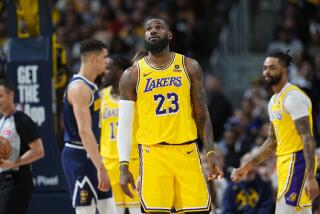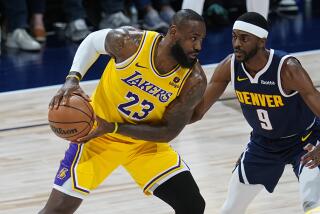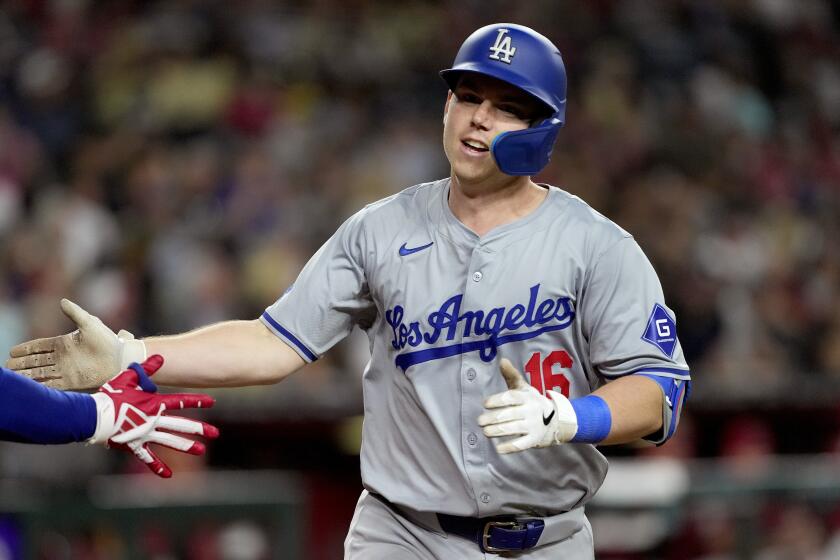Leagues protective of lucrative assets
Broadcasters have sought sweeping rights from the sports leagues they cover to distribute game video wherever fans might watch -- on television, on the Internet or even on mobile phones.
The leagues, which initially paid outsiders such as ESPN and CBS SportsLine to manage their websites, are now more protective of their digital assets, especially now that they are a source of advertising revenue.
Here’s an overview of how major sports organizations approach digital distribution of action footage.
Major League Baseball
MLB.com is baseball’s dominant online portal by design. Yahoo and ESPN stream highlight clips, and ESPN has streamed the annual All-Star Break Home Run Derby. But the league wants fans to come to its website to catch the live action.
MLB.com streams live audio and video of every game played. Fans can cast All-Star votes online, play fantasy baseball games, buy game tickets (more than 24 million have been sold through the website this year) and track scores and news in Chinese, Korean and Spanish.
“Baseball, by the nature of the beast, plays every day. Therefore people are thinking about baseball every day,” said Bob Bowman, chief executive of Major League Baseball Advanced Media, which oversees the sport’s new media strategies. “For that reason, our [Internet] traffic is very high.”
National Football League
The NFL’s online strategy is simple: “We are the only place online where you can see footage of NFL games,” said league spokesman Brian McCarthy.
And it’s not even live action. Just highlights.
“We don’t extend [online] media rights to our media partners -- ESPN on cable, and CBS, Fox and NBC in broadcast television,” McCarthy said. “It’s a strategic business decision to retain rights to our games, even to the point that we don’t put games on NFL.com. Highlights are the one thing that you will see as we relaunch [NFL.com] this fall.”
NASCAR
NASCAR splits its media rights among three partners -- TNT, Fox and ESPN. The best measure of television’s importance to the stock car racing association is the eight-year, $4.48-billion rights deal that took effect this year. Like other sports, it is moving cautiously to release its video to sites other than NASCAR.com.
ESPN and Fox are allowed to stream races live on their own websites. But NASCAR is also scrambling to add such digital bells and whistles as online stores, ticket windows, blogs and areas where users can share their own content with like-minded fans.
“That’s one of our major initiatives for NASCAR.com,” said James Monroe, NASCAR’s director of broadcast and new-media operations. “We’re blowing out the community section with blogs, chat and, potentially, an area where NASCAR fans can post their own media elements. The strategy is to give NASCAR fans a community experience through NASCAR.com.”
National Hockey League
Hockey, which continues to recuperate from the 2005-06 season that was lost to a labor lockout, allows Comcast to stream out-of-market games to its broadband subscribers. And it has partnered with Slingbox, which has ruffled feathers by allowing fans to “forward” local TV feeds to their computers via the Internet so they can watch, say, an L.A. Kings broadcast wherever they are in the world.
The league prefers to steer fans to NHL.com and team websites. But the league also has struck deals with other sites -- including YouTube and Joost -- where fans are encouraged to share their favorite highlight reels.
“We’re not content fascists,” said Keith Ritter, president of NHL Interactive Cyber Enterprises, which represents the league’s interests in new media.
National Collegiate Athletic Assn.
The NCAA has allowed CBS, its men’s basketball Final Four media partner, to stream early-round postseason tournament games on the Internet. But the Indianapolis-based organization has a history of keeping a tight grip on most of its content -- to the point of blacklisting fans who resell tournament tickets through anyone other than its licensed broker.
The NCAA recently made news when it revoked the press pass of a newspaper reporter who was blogging live from a baseball tournament game.
It recognizes that there is a “fair use” issue when it comes to reporting the nuts and bolts of contests. But the NCAA determined that live blogging during games “was color commentary, details, a description of the game itself,” said Greg Shaheen, the NCAA’s senior vice president for basketball and business strategies. “And that goes beyond fair use.”
More to Read
Get our high school sports newsletter
Prep Rally is devoted to the SoCal high school sports experience, bringing you scores, stories and a behind-the-scenes look at what makes prep sports so popular.
You may occasionally receive promotional content from the Los Angeles Times.






